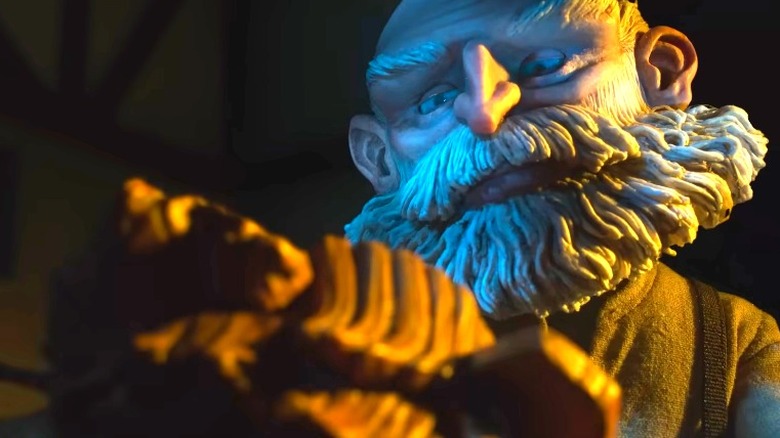Guillermo Del Toro Aimed To Craft The Anti-Pinocchio
Guillermo del Toro has been trying to bring Gris Grimly's twist on Pinocchio to the silver screen for a long while (via Bloody Disgusting). Usually, whenever a project is held up in gridlock for so many years, it gets stuck in development hell for eternity. Later this month, however, this little Hollywood miracle will debut in box offices across the country and be available for streaming on Netflix in December.
The media campaign to get fans hyped for the film has been slowly dropping breadcrumbs over the past two years. Although there is a lot of excitement, this official tweet from Netflix in 2020 upset some of del Toro's fans who grew up loving the original children's novel and theatrical adaptations. Twitter users like @baumanstyle complained that it would be disrespectful to Italian culture to change the story setting from the late 1800s to the 1940s and make it political by incorporating fascism into the plot. Others, like @TinTommaso, correctly pointed out that if old school "Pinocchio" fans were expecting the "edulcorated tale they read us as children ... they don't know Del Toro." Following up on that astute point, Looper attended the Animation Is Film Festival that featured a Q&A between del Toro and Phil Tippett, where they discussed all things related to animation. Del Toro reemphasized that the narrative will not be the version that most people are used to.
Will fans of the classic novel be able to accept an inversion of the original story?
During the Q&A, Guillermo del Toro went into more detail about the type of "Pinocchio" he wanted the world to see. "We certainly wanted to make an anti-what Pinocchio had been before. Instead of control and obedience, disobedience. Instead of everybody teaches Pinocchio and he changes, he doesn't change as much. Everybody changes around him." That sounds like a significant divergence from what people have come to expect when they talk about the little wooden boy who wished upon a star in the '40s Disney classic.
Interestingly, history might be about to repeat itself with del Toro's version of the story. In the original first edition, published in 1881, Pinocchio was hanged to death as punishment for his bad behavior in the end. But — much like the upset Twitter users we mentioned above — the author's publisher demanded a rewrite after fans complained. The edition, which was published in 1883, is the one with the happy ending that literature fans fawn over today.
We sincerely doubt del Toro would cave to such pressure in these modern times. And we'd wager that most of his fans wouldn't want him to, either. But if the "Pinocchio" reviews we've seen so far are any indication, he likely won't have to.

